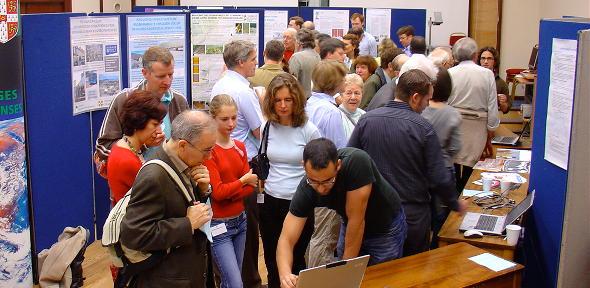
The Cambridge University Engineering Association conference was held as part of the recent annual Alumni weekend. The event was a great success with contributions from the following groups in the Department:
Enecsys - Asim Mumtaz, Lesley Chisenga, Nabin Shrestha, Andrabadu Viraj
Enecsys, a spin-out company from the Engineering Department is developing a series of power-conditioning units (PCU), or inverters, that take the output directly from individual solar panels and conditions it so that it can be fed directly into the mains grid, thus qualifying for government incentives on 'feed-in' tariffs where applicable. The patented Enecsys technology provides several key advantages over existing systems, especially ease and cost of installation, reliability and improved system efficiency giving faster payback on capital costs than current systems. The Enecsys team demonstrated this next generation power converter for solar modules.
Silent Aircraft Initiative - Alex Quayle
The aim of the Silent Aircraft Initiative is to generate a credible commercial aircraft design that would be inaudible outside of an airport in a typical urban environment. This Cambridge-MIT Institute project is a joint venture between the two universities involving over thirty academics and a large number of industrial partners.
CUER Cambridge University Eco Racing - Geoff Cunningham
Cambridge University Eco Racing (CUER) is a student-led initiative aiming to design and build a Solar Electric Vehicle to compete in the World Solar Challenge (WSC) in 2009. Founded in January 2007, CUER has successfully recruited 20 enthusiastic team members and secured strong departmental support. CUER displayed posters, photos and a slideshow about the team, with sponsor packs available to pick up.
A small scale "Non-Inertive-Feedback-Thermofluidic-Engine" (NIFTE) pump - Christos Markides
This type of pump is thermally powered, in the case of the demonstration by using heat from an electric heater, but in a real life application this would be waste heat, or heat from the sun, to produce hydraulic (pumping) work without the need of mechanical moving parts. NIFTEs are self-starting, and require only small temperature differences to operate. They are simple, reliable and cheap to manufacture and run. They have many humanitarian applications, such as the supply of drinking water or water for agriculture in the developing and third-world, as well as other applications such as domestic hot water circulation.
Sustainable manufacturing group at the Institute for Manufacturing (IfM) - Kathryn Jackson
Projects include incremental sheet forming, polymer recycling, recycling of aluminium by cold bonding and removal of toner from printed paper. A rig for removal of toner from paper was demonstrated.
Cambridge Vehicle Dynamics Consortium - Jonathan Miller
Long combination heavy goods vehicles provide benefits such as reduced congestion and fuel consumption. These vehicles are not presently used in the UK because they cannot negotiate our roundabouts. This project looks at active rear steering for articulated heavy vehicles to make them safer and more manoeuvrable.
High speed in-cylinder sampling in internal combustion engines - Simon Regitz
High speed sampling valves are useful tools in understanding the combustion process and emissions characteristics of internal combustion engines. In the work presented a high speed sampling valve based on a gasoline direct injector has been developed. Cyclically resolved measurements of in-cylinder nitrogen oxide (NOx) and carbon dioxide (CO2) have been carried out to evaluate Exhaust Gas Recirculation variations and nitrogen-monoxide (NO) formation.
Engineers Without Borders - Miranda Segar, Ben Taylor, Ciaran Malik
EWB-UK's mission is to facilitate human development through engineering. Run by students and assisted by professional volunteers, EWB trains and educates students and recent graduates in development theory and practice. EWB's actvities include local community work, talks and trips, training courses for students, and running annual placements for suitable students and graduates in organisations and developing communities around the world. EWB-UK is a registered charity.
Markerless Motion Capture Using Multiple Cameras - Paris Kaimakis
Motion capture systems allow computers to quantify and digitise human motion. Once the motion has been captured, a separate recognition process can take place. This technology can be used in surveillance systems and human-computer interfaces. Other applications include animation and data compression.
Centre for Sustainable Development - Dr Heather Cruickshank and Priti Parikh
The Centre for Sustainable Development has grown to encompass the delivery of a one-year full-time taught MPhil in Engineering for Sustainable Development, which was introduced in 2002 and a research community covering sustainable development issues in the fields of water, waste, sustainable communities, assessment methodologies and fragile nation states. The work adopts a multi-disciplinary approach and focuses on the context and complexity in which engineering products and services are delivered.
Geotechnical Engineering - Ulas Cilingir
Seismic behaviour of the underground structures. Ulas is looking at the soil-structure interaction between the tunnel and the surrounding ground during the earthquakes. His research involves advanced techniques like dynamic centrifuge testing, digital image analysis and finite element modelling.
Department of Engineering Educational Outreach - Joy Warde
Introducing young people to the fun and creativity of engineering in a University research environment. In 2006-7 over 2200 young people and their parents and teachers visited the University for a hands on design-build-test engineering challenge. These events were supported by 110 engineering student, staff and alumni volunteers who acted as role models for the next generation of engineers. To support these visits Joy has developed a variety of hands-on projects for all age groups ranging from 'Rocket Launchpad' for primary school children, to programming lego robots for A level students to 'Crane Construction Challenge' for family teams. Outreach displayed a range of projects, feedback from participants and plans for the future of Engineering Outreach.

